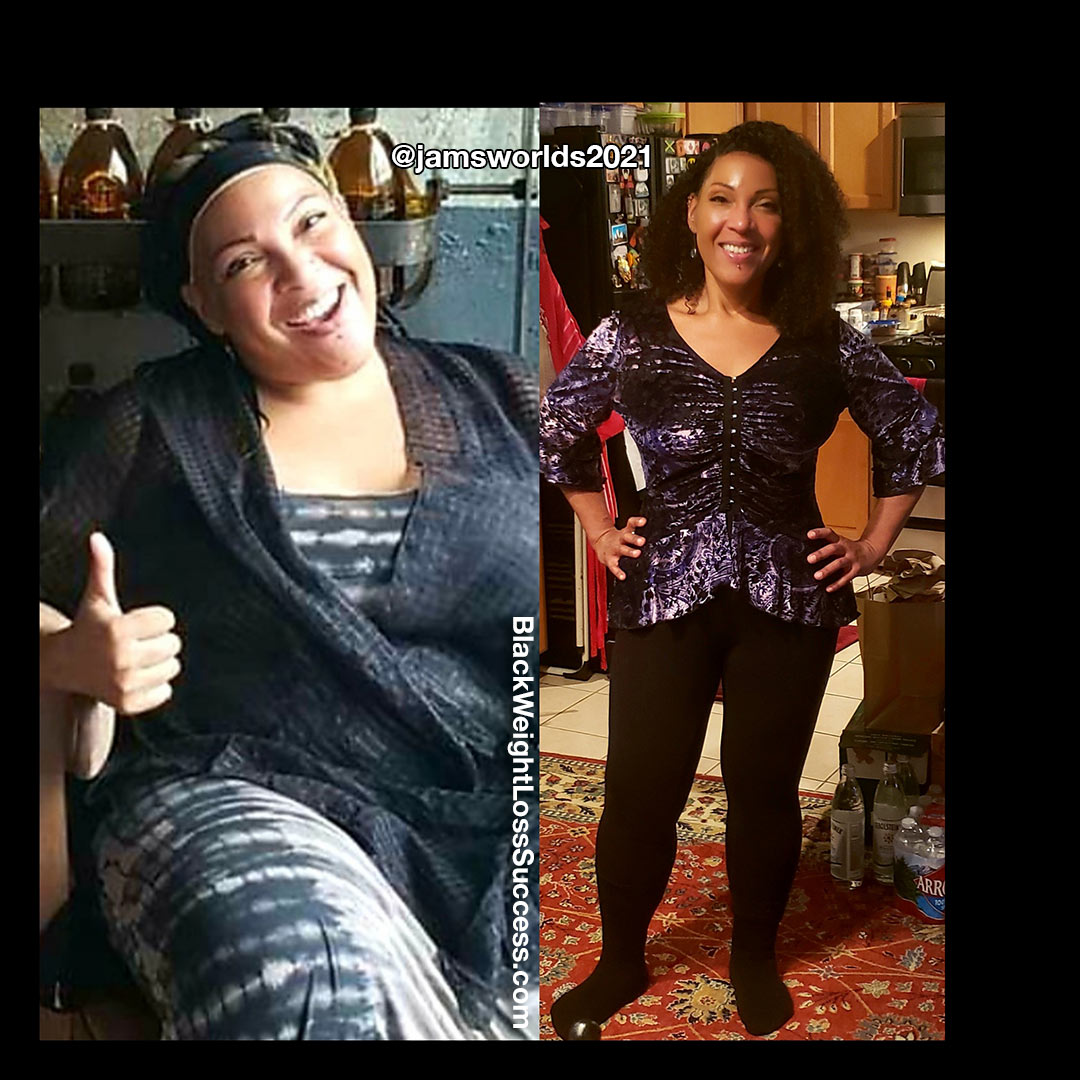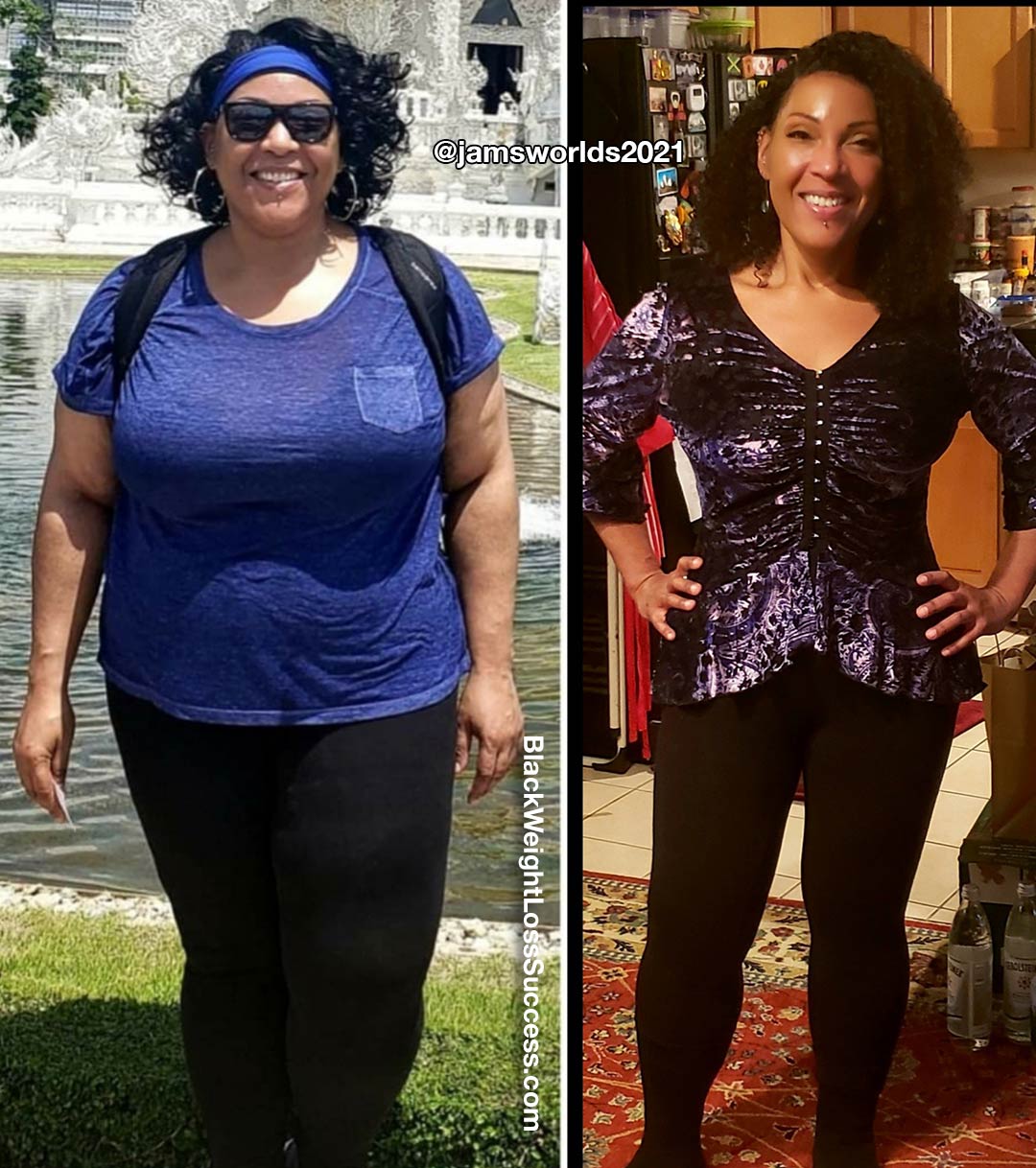Transformation of the Day: Jamie lost 100 pounds. Back in 2019, she experienced two very traumatic events that served as the catalyst for her transformation journey. To change her life, she had to investigate and change her eating and exercise habits and her mindset and thought life. Intermittent fasting and keto meals are part of this 57 year old’s healthy routine.

What was your motivation? What inspired you to keep going, even when you wanted to give up?
I always said I wouldn’t be someone who waited until something major happened to my health to get it together. Never, not me. I’m smarter than that. Then, back in 2019, I almost died not once but twice from random events.
In March 2019, I was rushed to the ER after a temp check (I was recovering from a sinus infection from the week prior). The paramedics rushed me to the ER. They kept saying I was about to go into cardiac arrest or have a stroke “any minute,” which was news to me. Apparently, my blood pressure registered so high that I was off the BP meter altogether. Prior to this, I never had high blood pressure my entire life, even when I was much heavier. After a battery of tests, an IV, and pills, they let me go home. My own doctor couldn’t figure it out either, and I was put on medication.
That following December, I was car #1 in a five car crash. Traffic slowed to stop, and I stopped behind them. The guy behind me also appeared to slow to a stop. However, the car behind him crashed full speed into him at 80 mph. He crashed into me, and the 2 cars behind him also crashed while trying to avoid hitting us. That 80 mph car was a hit and run and fled the scene immediately, according to the webcam someone happened to have on their dash. I was able to walk away from the accident unscathed, sans a few months of chiropractor and physical therapy from the shock.
These two events had me shook. They were random but in each case, I felt I was given a chance to make a change because I was reminded how brief my life was and just how unexpectedly and suddenly life could change.
I began working on my mind space and did a lot of research on various health modalities, like intermittent fasting and the bioscience behind it. All I knew was I didn’t want to take pills for LIFE. I wanted a permanent change that was sustainable. Mental health preceded physical health. It was different and unexplored. Once my headspace was calibrated, it was game on.
I dragged my feet for a week, still insecure about being “ready.” On January 7, 2020, I began with a (nothing-special) very strict low calorie “cleanse diet”. It was non-sustainable and not at all easy, but it was what I needed as a bridge to kick my sugar addiction. Like any addict kicking anything, it wasn’t pretty. It was mad uncomfortable, and that was the part that required all of my effort and focus the most. After a few weeks head down, I could breathe. I had a rhythm. I ended the cleanse after 40 days. Then, I began daily Intermittent Fasting with unrestricted keto cooking (I’m a huge foodie/cook/chef).
Because I was already “fat-adapted,” it was a breeze, and the food felt like pure indulgence. Fasting for the first time was definitely mental. I had read all the books and began following all the influencers, authors, nutritionists, and cooks that aligned with my interests and goals and simply took notes. I made sure not to rely on only ONE source for information and to gauge the info against my own known behavior and emotive triggers. (Sort of like setting your alarm clock 10 minutes fast so you’re always on time). After the first few days, I was empowered. I began with 20:4, and it seemed to fit like a glove. After 3 weeks in, I had my first extended fast experience (72 hours), and it was amazing. I began doing that once a month for about 6 months.
I cook A LOT but can’t eat a lot anymore because my Leptin (the satiety hormone) is extremely strong. I never knew it was “broken” before my fasting experience, but reading about it and experiencing it are WORLDS apart! It’s hard to articulate what it is not to feel hungry, even emotionally hungry, and that has been key. I transitioned to ADF (Alternate Day Fasting) in September, and it has been pretty awesome.
I do not measure, count, or track macros, calories, or even carbs. I am mainly keto and low carb? Yes. For me, tracking was diet verbiage, and it’s psychologically unsustainable for me. I needed an everyday life plan. I DO eat a certain way, and keto foods (no grains/sugar/gluten) are the focus. However, I will have something undeniably NOT keto once a month or once in a while. I DO have a daily spreadsheet I have kept from day one about everything but food (measurements, weight, workouts, etc.).
I was 56, and I wanted a better quality of being and of living that I had neglected up until then. Healing was my aim. Weight loss was my bonus. Did I want to give up? Honestly, no. Not this time. WHY? I never approached it like I always approached health in the past: as a diet, as restriction, and as WORK. I’m 57 years old now, and I’ve been on some kind of diet since I was 7 years old. I weighed 350 pounds by age 12. I hit that number again in my 20’s and hit 360 pounds in my 30’s. I know this struggle and the mental tapes that had been drilled into me all of my life. These tapes had to go. I approached it ALL as science. I only focused on that bioscience, geeked out, and devoured all of the information that I could find.

What did your workout routine consist of? How often did you work out?
I didn’t begin consistently until April, right after the COVID shutdown. I started with just 30 minutes a day on my Bowflex Tread climber, about 2-3x a week. Now I work out on it daily with a day off each week. I keep it at 30 minutes to fit it into my busy schedule. I have also begun weight training with kettlebells since gyms are closed, but I find it more challenging without guidance.
What was your starting weight? What is your current weight?
I began at 260 pounds, and I currently weigh 160 pounds. I believe my original goal was 145-150 pounds, so I am still in weight loss mode but also muscle-building mode.
What is your height?
5’4”
When did you start your journey? How long did your transformation take?
I began the mental part of my journey after my car accident. I began the mechanics in January 2020, so it’s been about 10 months.
What is the biggest lesson you’ve learned so far?
I learned that this is not a “one size fits all” situation. The real work is in your head and finding a way to do that work first. Also, what works for one may not work for all, and that’s okay. You can find your way, and it has to be unique to you specifically. Be your own advocate. Do the research and groundwork. Be prepared to tweak your efforts along the way.
What advice do you have for women who want to lose weight?
Diets generally only address the symptoms but not the cause. Behavior isn’t changed by mechanical knowledge alone. Finding ways to unlock your personal stress and frustration that don’t include food is a start. If triggers or emotive “tapes” can’t be faced, then change can’t be rooted (no matter the diet or workout).
Just keep an open mind. Try approaching it from another perspective other than the one you are the most familiar and comfortable with. Try and come out of your comfort zone about how you view weight loss and your journey. Make it “bite-sized.”
I began with daily “day-to-day goals” and not the usual “calendar goals” I used to make. For example, I didn’t say I needed to lose “X” by “X” date. I focused on being present every day. That is my best advice.
It’s never too late, and all things are possible. Believe that. If I can do this, you can too!
Instagram: @

Melvina c Jonesleslie says
Congratulations on your amazing transformation, you look FANTABULOUS!
Thank you for sharing your story, Your advice is definitely a great motivation.